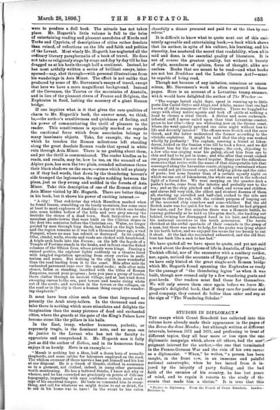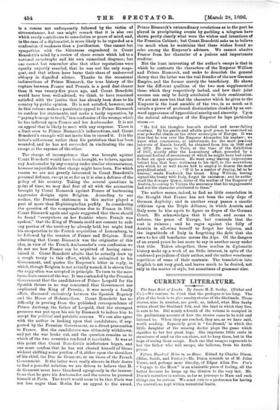STUDIES IN DIPLOMACY.*
• Studies in Dip:omecv. From the French of Count Benedetti. London : Heonema• n. THE essays which Count Benedetti has collected into this volume have already made their appearance in the pages of the Revue des deux Mondes ; but although written at different intervals, between 1871 and 1891, and professing to treat of different topics, they all bear more or less upon the one diplomatic campaign which, above all others, had the mor',--•-•". poignant interest for the author,—the one that terminated in the France-German War and the ruin of his own career as a diplomatist. "When," he writes, "a person has been caught, in the front row, in an immense and painful national catastrophe, when he has issued from it in- jured by the iniquity of party feeling and the bad faith of the enemies of his country, he has lost peace of mind, and to regain it resorts to the study of the events that made him a victim." It is true that this is a course not unfrequently followed by the victim of oircumstancee, but one might remark that it is also one which rarely contributes to consolation or peace of mind, and, in the case of a diplomatist, is more likely to be regarded as a confession of weakness than a justification. One cannot but aympatbise with the bitterness engendered in Count Benedetti's mind by a review of those events which led to a national catastrophe and his own unmerited disgrace; but one cannot but remember also that other reputations were equally unjustly assailed, that he was not the only scape- goat, and that others have borne their share of undeserved obloquy in dignified silence. Thanks to the occasional indiscretions of Prince Bismarck, the true history of the rupture between France and Prussia is a good deal clearer than it was twenty-five years ago, and Count Benedetti would have been well-advised, we think, to have remained satisfied with the justice that has already been done to his country by public opinion. He is not satisfied, however, and in this volume makes a passionate appeal to Prince Bismarck to confirm his statements, and make a tardy reparation, by 4‘ paying homage to truth," in a confession of the wrongs which he has inflicted upon France and her Ambassador. It is not an appeal that is likely to meet with any response. There is a limit even to Prince Bismarck's indiscretions, and Count Benedetti's example will not invite him to exceed it. It is the batter's self-esteem rather than his patriotism that has been wounded, and he has not succeeded in vindicating the one except at the expense of the other.
The charge of incompetence that was brought against Count Benedetti would have been brought, we believe, against any Ambassador by any country under similar circumstances, however unjustifiable that charge might have been. For which reason we are not greatly interested in Count Benedetti's personal defence, except in so far as it is also a defence of the policy of his country. Taking the several questions in point of time, we may deal first of all with the accusation brought by Count Bismarck against France of harbouring aggressive designs upon Belgium. According to our author, the Prussian statesman in this matter played a part of more than Mephistophelian perfidy. In considering the question of the compensations due to France in 1866, Count Bismarck again and again suggested that these should be found "everywhere on her frontier where French was spoken," that the King of Prussia could not consent to cede Any portion of the territory he already held, but might lend his co-operation to the French acquisition of Luxemburg, to be followed by the reunion of France and Belgium. Even admitting that Count Bismarck was the originator of this idea, in view of the French Ambassador's own confession we do not see how France can be acquitted of having enter- tained it. Count Benedetti admits that he actually drew up a rough treaty to this effect, which he submitted to his Government, and quotes the Emperor's letter in reply, in which, though Belgium is not actually named, it is shown that the suggestion was accepted in principle. To turn to the more immediate causes of the war. It was contended by the Prussian Government that the candidature of Prince Leopold for the Spanish throne in no way concerned that Government nor implicated the King of Prussia ; it was merely a family affair, discussed exclusively between the Spanish Regency and the House of Hohenzollern. Count Benedetti has no difficulty in proving from the published correspondence of Prince Anthony, the father of Leopold, that the strongest pressure was put upon his son by Bismarck to induce him to accept for political and patriotic reasons. We can also agree with the author in looking upon that candidature, if sup- ported by the Prussian Government, as a direct provocation to France. But the candidature was ultimately withdrawn, and yet the war broke out, and the question remains as to which of the two countries rendered it inevitable. It was at this point that Count Benedetti's misfortunes began, and cue must confess that he has not cleared himself of blame without shifting some portion of it, either upon the shoulders of his chief, the Dim de Gramont, or on those of the French Government. If the latter were really sincere in their desire to find a peaceful solution, we are driven to believe that M. de Gramont must have blundered egregiously in the instruc- tions that he gave his Ambassador and the course he pursued himself at Paris. The truth would seem to be that Paris was not less eager than Berlin for an appeal to the sword.
Prince Bismarck's extraordinary revelations as to the part he played in precipitating events by garbling a telegram have shown pretty clearly what were the wishes and intentions of the Prussian Cabinet; but Count Benedetti asks us to believe
too much when he maintains that these wishes found no echo among the Emperor's advisers. We cannot absolve France from her character of a jealous and importunate
creditor.
Not the least interesting of the author's essays is that in which he contrasts the characters of the Emperor William and Prince Bismarck, and seeks to demolish the general theory that the latter was the real founder of the new German Empire, and the former merely the beneficiary. He shows how the different qualities of the two men supplemented those which they respectively lacked, and how their joint success can only be fairly attributed to their combination.
We are not sure but that the character which he gives to the Emperor is the least amiable of the two, in as much as it entails a power of profound dissimulation cloaked by an out- ward appearance of hypocritical suavity and sincerity. Upon the natural advantages of the Emperor he lays particular stress :—
"He hid his thoughts beneath studied and never-failing courtesy. By his gentle and affable good grace, he exercised an ever powerful charm on the other sovereigns of Europe. It was thus that he won over the Emperor Alexander, his nephew; we know what concessions, so unfortunate for the most precious interests of Russia herself, he obtained from him in 1866 and in 1870. He came to Penis, at the time of the Exhibition of 1867, shortly after the Luxemburg affair, preceded by a national feeling of resentment of which he might have had cause to fear an open expression. He went away leaving impressions behind him that bore testimony to his skill, to the marvellous arts which he so well knows how to employ to disarm the most
prejudiced mind If it be a matter of duping, let us be knaves,' wrote Frederick the Great. King William, having signed the treaty with Italy, forgot its existence ; and he &litho- rised the dowager Queen, sister of the mother of the Emperor of Austria, to convey to Vienna the assurance that his engagements had not the character attributed to them."
The author seems, indeed, to find no little consolation in the thought that France has not been the only dupe of German duplicity ; and in another essay passes a caustic criticism upon the Triple Alliance, in which Austria and Italy seem to him again to figure as dupes of the German Court. He acknowledges that it offers, and seems to enforce, the peace of Europe, but contends that the coat is ruinous ; and he rages against the folly of Austria in allowing herself to forget her injuries, and the ingratitude of Italy in forgetting the debt that she owes to her old benefactor across the Alps. Of the dangers of an armed peace he has more to say in another essay under that title. Taken altogether, these studies in diplomatic history make up a work of no little interest, in spite of the confessed prejudices of their author, and the rather wearisome repetition of some of their contents. The translation into English is not very good, and leaves much to be desired, not only in the matter of style, but sometimes of grammar also.







































 Previous page
Previous page